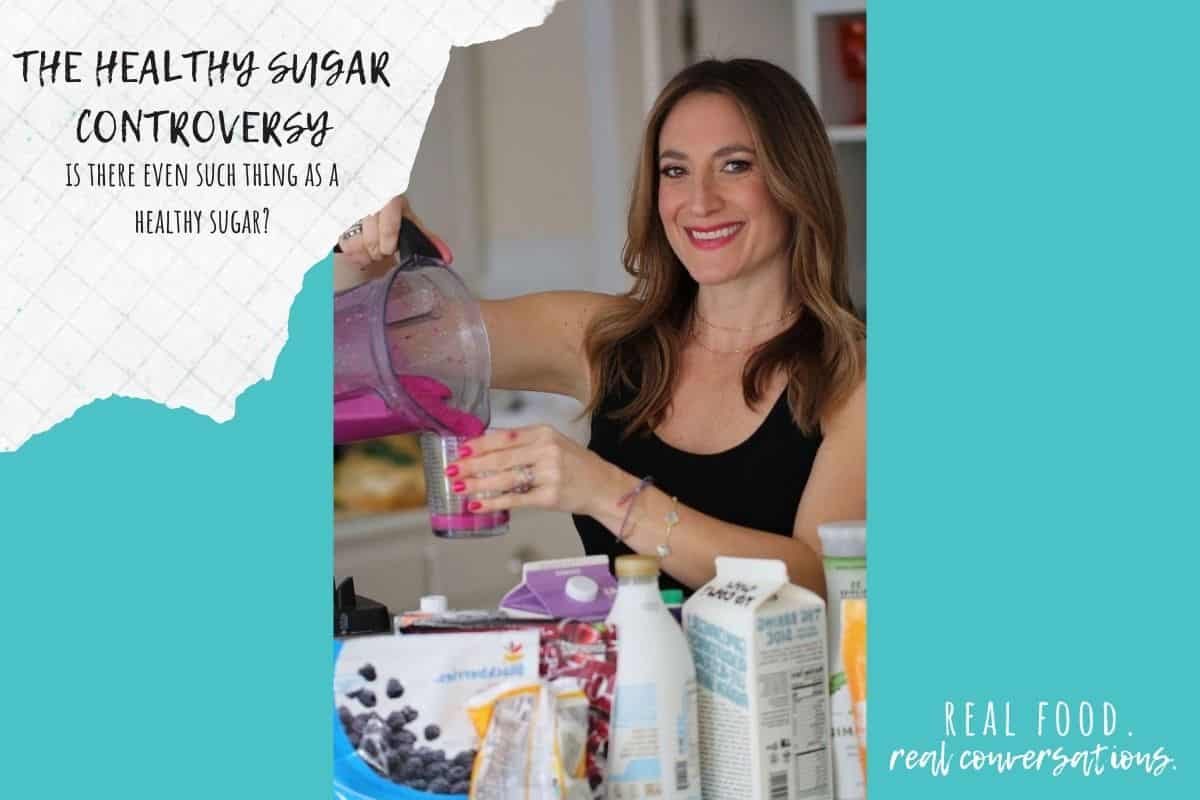Is there a healthy sugar? Sugar is one of the most controversial food topics out there. Listen to find out as we dissect the differences!

Sugar is basically a carbohydrate. There are so many types, it's hard to figure out what is what and if some are better than others. Good thing we are chatting with a licensed dietitian to tell us the facts!
Podcast: Play in new window | Download | Embed Subscribe now! Apple Podcasts | iHeartRadio | TuneIn | Deezer | RSS | More
Laura Burak is a seasoned OG registered dietitian for more than 17 years, a true foodie, a wannabe chef, a yogi and a mama in the Long Island suburbs outside NYC.
GetNaked Nutrition is all about stripping down to the simplicity of food and nutrition and finding joy and pleasure from it. She hopes to inspire you to become the healthiest badass version of yourself at any age!
Grab her FREE Trader Joes Shopping List here!
What are Sugars?
Sugar is essentially two glucose molecules. Glucose is what we use for energy, it is a carbohydrate.
When it comes to sugar, our body processes all sugars the same. Whether you are eating honey or good old white table sugar, our body sees it as the same.
However, there is a difference between natural sugar and added sugar. Lactose (milk) and fructose (fruit) are natural sugars. And the things you typically use to sweeten your foods are added sugar. Added sugars come in a variety of names.
Some of the most common names of added sugar you may see in an ingredient list are: malt/malt syrup, cane juice, cane syrup, carob syrup, glucose, maltose, dextrose, high fructose corn syrup, honey, maple syrup and many more.
In the most recent update for food label guidelines, added sugars are now required to be stated on the label. It's important to know how to read food labels so you know what is in the packaged food you buy.
What is the Healthiest Sugar?
When it comes to sugar, your body recognizes them all in the same way. Sugar is not a nutrient dense food, and therefore not something you'd consider nutritious.
This doesn't mean you can't eat it, however when talking about sugar there are things you can look at to decide what is the best one for your needs. Is there a specific flavor you want? Are you looking to keep your blood sugar from spiking? Is there a "look" you need it to have?
When it comes to looks, the differences in the colors are related to the way they are all processed. Molasses is a byproduct of sugar processing, and what gives the browner colored sugars their darker color. Molasses contains the nutrients of the sugar.
While the darker sugars do have more of their nutrients in them, they are still not a nutrient dense food. Sugar does not provide near enough of the nutrients to make it considered nutritious, and if you were to eat the amount you need to gain any nutritional value, you'd probably die of sugar overdose. LOL
Looking at the food overall instead of just the sugar can give you a better picture of how it will react in your body. Protein, fiber and heart healthy fat helps keep you full and satisfied and helps control your blood sugar from spiking.
Glycemic Index (GI)
The glycemic index number of a food tells us how it affects our blood sugar. Meaning how quickly is that food digested and how our blood sugar levels rise. Eating foods with protein, fiber and healthy fats helps slow down digestion and therefore helps keep our blood sugars from rising too rapidly.
The lower GI values mean that food makes your blood sugar rise slower and higher GI means it makes your blood sugar rise faster. Medical conditions like diabetes require you to watch your blood sugar levels.
Sugar alternatives
When people talk about sugar alternatives, they are talking about the sugars that have a zero GI value, or close to it. They are good for people that are very sensitive to sugar or need to control sugar medically, but they can have some negative side effects.
They key when choosing a sugar is to ask yourself:
- Do you like the taste
- Is it helping you on your health journey
- Does it satisfy your craving
The most popular sugar alternatives that many consider "healthier" choices are:
- Stevia
- Monk fruit
- Allulose
- Date syrup
Some others that are deemed "safe" but have had some controversy due to some studies linking them to health issues are:
- Sucralose (Splenda)
- Aspartame (Nutrasweet, Equal)
- Saccrarine- now off the market
And lastly are the sugar alcohols. These are known to have some adverse side effects in the digestive system for some people:
- Erythritol
- Maltitol
- Sorbitol
- Xylitol
A main issue with all of these sugar alternatives is that they are much sweeter that other sweeteners. Some train of thoughts believe that because of this, you can raise your threshold on how sweet you need things to be, which can lead to potential issues later on.
The bottom line is moderation. Fill your diet with mostly nutrient dense food and enjoy the rest on the side.
Don't forget to grab Laura's FREE Trader Joes Shopping List!

PS- If you liked this episode of Real Food Real Conversations, please subscribe and leave me a review!
And tag me on Instagram whenever you're listening! I reply to all my messages!


Valerie
My favorite sweetener is fruit! Blenderized dates, mashed banana, blenderized raisins -- they all work pretty well as sweeteners, depending on the recipe, and of course they have the full nutrients of fruit.
veggiesdontbite
Love those ideas Valerie!